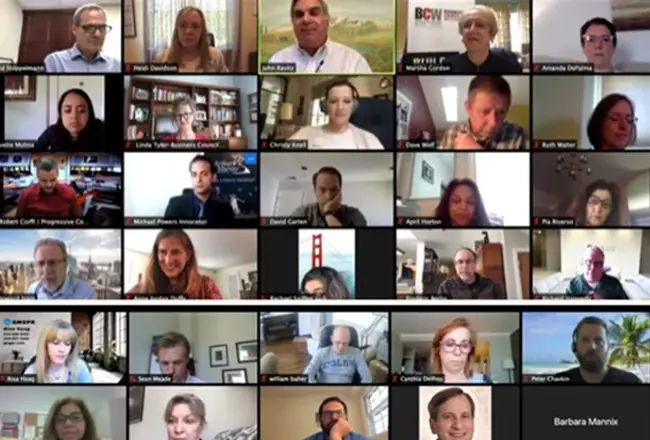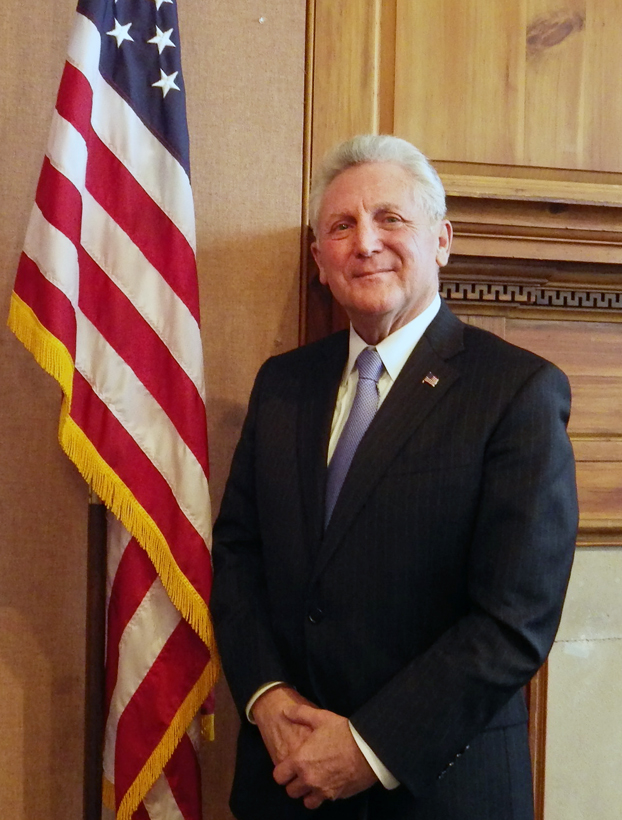“We need to on a macro level instill consumer confidence again and get people to start traveling. Hospitality and tourism are among the hardest hit sectors so far,” Sean Meade, general manager of the Cambria Hotel in White Plains and president of the Westchester Hotel Association told an online meeting.
Meade was one of more than 150 members of businesses and nonprofits attending a virtual town hall meeting of The Business Council of Westchester”™s Economic Recovery Task Force. The meeting was moderated by BCW Vice President and COO John Ravitz.
The task force has 44 members and its goal is to gather recommendations and deliver those recommendations to the governor”™s reopening task force as well as County Executive George Latimer, according to Marsha Gordon, president and CEO of the BCW.
“Over the coming weeks and months as Westchester reemerges from the shutdown, we will face daunting challenges,” Gordon said.
Meade highlighted a major challenge for the hospitality and tourism sector.
 “We need to conserve our cash and figure out ways to keep our cash positive so we can continue to operate. Once we run out of cash, you know, that”™s it for us,” Meade said. “Some of our hotels have suspended operations already and are looking to resume July, August. Some of the smaller hotels like ourself are staying open for as long as we can. We also need some help with marketing. That”™s going to be a key success factor for us.”
“We need to conserve our cash and figure out ways to keep our cash positive so we can continue to operate. Once we run out of cash, you know, that”™s it for us,” Meade said. “Some of our hotels have suspended operations already and are looking to resume July, August. Some of the smaller hotels like ourself are staying open for as long as we can. We also need some help with marketing. That”™s going to be a key success factor for us.”
Andy Castellaneta of Transworld Business Advisors in White Plains proposed creating a holding company to provide capital to businesses.
“The strategy could be deployed to any industry ”” retail, restaurants, services, hospitality. The list is endless, so no one should be left behind in the structure,” Castellaneta said. “It”™s a classic model, holding companies. A three-legged-stool model where you”™d have equity investors, maybe some SBA lenders and of course government involvement, which would be the glue to it all.”
Development consultant Neil DeLuca of the DeLuca Group said that he”™d like to see the reopening process become an opportunity to address some of his government and political concerns.
“One: No more special interests. Make them illegal,” DeLuca said. “Two: term limits. If you can”™t get it done in six years, get out. You see what happens at the federal and state governments. One feeds the other.”
DeLuca said there should be no exceptions to the 2% cap imposed in New York for tax increases. He said there should be an end to unfunded mandates. He also said that all local planning and zoning decisions should be made by independent boards, not political bodies.
“Political bodies cannot do it and things have snuck in during the years to thwart developers making money. If we aren”™t allowed to make our 12% return on our investment then government won”™t have the money to pay cops, firefighters, teachers, all those heroes you saw on television the last three months. We need to make money to give government the money they need,” DeLuca said.
Susan Fox, president and CEO of the Westchester Institute for Human Development, is a representative of the nonprofit community on the task force. She said that nonprofits need to be eligible to receive any financial resources that are available to help with the recovery.
“We are critical to a healthy and safe reopening. My number one request is that we continue access across all payers to telehealth, telemedicine. That”™s been a godsend to my organization,” she said. “I”™m really hoping that with all of the budget constraints that we”™re going to be facing over the next year that not-for-profits aren”™t seen as an easy place to make those cuts.”
Richard Haggerty, CEO of the Hudson Gateway Association of Realtors, said that the real estate industry needs to ramp up in-person showings.
“At the end of the day we have a lot of prospective purchasers who want to move to Westchester County, who want to bring their tax dollars to Westchester County. Last year, New York state collected over $3.2 billion from real estate transactions,” Haggerty said. “Even if those folks start entering into contracts in June it will be another two or three months before they actually close, so the sooner we can get in-person showings so buyers and new residents can move to Westchester the better off we”™re all going to be.”
Bud Hammer, owner of Atlantic Westchester, a commercial HVAC service in Bedford Hills, said that the coronavirus outbreak has brought a renewed focus on air quality in buildings that are occupied by the public, whether schools, city halls, office buildings, theaters or sporting venues.
“Whether you own a building or occupy it, don”™t believe some of the snake oil that”™s being proposed out there as far as being the magic bullet to kill the coronavirus,” Hammer said. “In my industry they have not discovered that yet. There”™s been a lot of research. There”™s a lot of safeguarding that can be done but it comes down to practice good hygiene, good sanitizing and try to just be careful.”
Jeff Haydon, CEO for the Caramoor Center for Music and the Arts in Katonah, said that getting in-person interactions is critical to reopening the economy.
“Staring at our computer screens all day certainly is not an effective substitute for inspiration and personal connections that come from going to conferences, performances, parks, restaurants, weddings, churches, you name it,” Haydon said. “Let”™s unleash the creativity of the field to find solutions and not have them dictated to us. It”™s essential that we find ways to inspire this recovery.”
Ben Palancia of Palancia Insurance in Mamaroneck suggested that the state consider COVID-19 liability protections for businesses. He said businesses need to be concerned that they have proper liability protection that would, for example, cover a restaurant or spa or job site against a claim that someone got sick there.
Joe Pizzimenti of CClean in Chappaqua said that his business of providing commercial cleaning and disinfection services never really stopped.
“The first impact that we felt in mid-March was really supply chain and now with the governmental mandate that businesses also have to provide PPE (personal protective equipment) I mean it”™s almost impossible for us to store N95 masks,” Pizzimenti said. “I understand that there”™s some action behind the scenes in the region to manufacture this PPE but we just haven”™t seen it and we don”™t know when supply is going to catch up and with that increased demand of all general businesses having to provide this PPE. It”™s a concern for us because it”™s our job to provide a healthy environment and how can we protect our own employees, that”™s our primary concern.”
Jane Solnick, public affairs manager for Con Edison, said that the company is getting ready to transition to where its employees will once again routinely be dealing in-person with the public.
“We”™re there to support the developers trying to work. We”™re doing the training so that we”™ll be able to enter people”™s homes but I think it”™s going to be a learning process for us all across the board.”




















